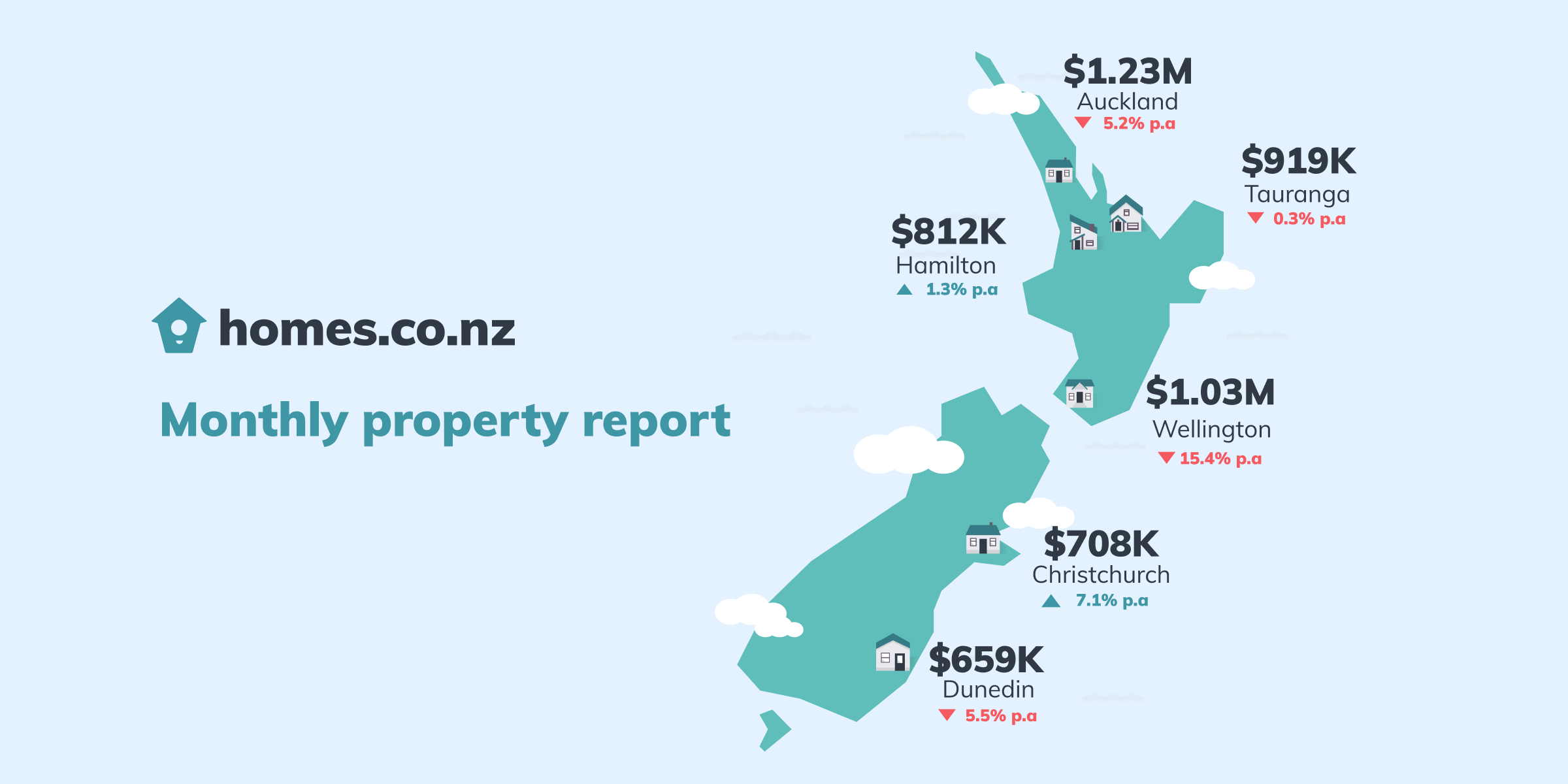Early Days Yet According to Valuers
Last week I released the results of my now regular survey of real estate agents around New Zealand. A valuer contacted me to say that he would welcome being included in the next survey and that got me to thinking that maybe there is some extra valuable insight which property valuers can offer. So, I went through my database of 10,000 subscribers and, as best I could, identified those working in valuation firms and emailed them all, asking for their insights. The response was good and I’ve spent considerable time going through the 25 responses and have summarised them here. However, this summary cannot do justice to the in-depth knowledge which was imparted. So, I have also included some extensive quotes which you might find interesting. My aim in doing this is to make sure people have a more realistic assessment of the true driving forces and developments in our housing markets than can be gleaned from mainstream media. Enjoy. And if you are a valuer reading this and you did not get an email, then email him and say you want to be contacted the next time I send the survey request out. tony@tonyalexander.nz
General Themes
- Valuers base their calculations of a property’s likely market value on the basis of data – actual transactions with adjustments for the particular characteristics of the relevant property. But with so few transactions they generally struggle to as yet gauge the extent to which prices have or will alter.
- Very few transactions have occurred, but for those which have prices have barely budged from pre-Covid levels. But the “heat” has gone out of previously very strong markets and sales prices are tending no longer to be well in excess of expectations as had been happening.
- There is a feeling that the main price effects may not be seen for up to six months.
- No real evidence exists as yet of properties being dumped by vendors desperate to sell at whatever the market will bear.
- A number of buyers in negotiations before lockdown have stepped back, waiting to see what happens with prices, or concerned about their personal financial situation.
Locational information was available for the following areas.
Auckland
- The city has been flat for four years while incomes have been rising. This will act as an insulating blanket for current prices against the effects of rising unemployment and temporarily reduced population growth.
- One valuer is recommending basing valuations on those during the quieter months of 2019 rather than months up to March when Auckland was heating up again after a three-year lull.
- Land prices are expected to fall with banks pulling back from financing land development.
Christchurch
- The supply of rental properties has risen but rents have not changed much yet. Price reductions for properties being sold are limited to 0% – 2.5% so far.
- “I think CHCH will probably flatten out and have a small drop in values in some micro markets. It
just didn’t have a boom during 2015- 2019 so has a low base.”
Gisborne
- Interest from both first home buyers and investors is holding up, reflecting the difficulties they have been experiencing pre-lockdown in finding properties.
Queenstown
- “Rental prices have dropped approximately 30% however they were extremely high pre-Covid and
the level they have dropped to is still a good level of rent for a landlord.” - The market is far more segmented than people tend to think. Managed apartments servicing foreign visitors are expected to see the biggest price reductions. Low-end properties may be supported by first home buyers finally being able to make a purchase.
- Prices so far appear down 5% – 10% on average.
- “Banks seem to be particularly cautious here at present with an extremely conservative emphas is on income.”
Wellington
- Listings have been, and remain, in short supply, so there is a backlog of frustrated buyers and their interest has remained firm during the lockdown. This includes the Kapiti Coast.
Quotes (covering all NZ)
- “Current buyer enquiries are coming from those that were pre-approved prior to Covid-19 and/or those who have not had their personal finances adversely impacted by the crisis. “
- “…good quality homes are still in high demand, however, for those that are a little unusual and/or have existing issues and had experienced difficulty in the market prior to Covid-19, it is expected
that there may be additional buyer resistance to such properties.” - “Low-cost housing, boarding houses and the like, are expected to be in hot demand as unemployment rises.”
- Quote of a quote from a first home buyer “‘It’s actually cheaper for us to buy now – our mortgage repayments are actually less than we were paying in rent’. ‘we’ve actually saved heaps more into our deposit these last few weeks, bank has pre-approved us more than we thought we could borrow and are looking at places we actually might want to live in now’.”
- “The new builds and apartments may experience a greater degree of correction than the traditional
house in the suburbs.”
Commercial Property
As with the Real Estate Survey, this Valuers Survey concentrates on the residential property market. However, a good number of values specialising in non-residential property offered their insights and they are summarised here.
- Transactions settling now and in recent weeks have been for deals reached pre-lockdown. So, we lack truly up to date valuation gauges.
- Properties for purchase by investors seeking yield away from low interest rates have been in very short supply and this will limit overall price declines.
- Nonetheless, declines are expected in rents for retail and hospitality space plus B and C grade office space. A-grade office space is expected to see rent levels hold.
- Well-capitalised investors are expected to continue to seek out quality properties with secure tenants on long-term leases. But extra deep scrutiny will be undertaken of tenants in grades B and C office space.
- Industrial property rents in Auckland are seen holding up along with their values due to shortagesof properties and anticipation of some manufacturing reshoring along with increased demand for storage space. There is some evidence of 2-3 month rent holidays being offered to entice tenants.
- Most at risk are rents and prices for retail properties in tourism locations, including those who used to receive cruise ship visits.
- Some landlords are offering tenants market rent reviews later this year and again next year in order to be seen as fair during this weak period.
Quotes
- On banks, … “…the reality is they are more nervous than they have even been and they are now being far more selective around the deals they are willing to support and funding will be readily available for their well-capitalised clients who have a good track record of delivery. “New to bank” clients will find it difficult to get credit approved.” And
- “Messaging from major banks is they are open for business and will do deals as long as they make sense. However, chatter from those who are putting (supposedly) good deals in front of banks, is they are fiercely reluctant to fund anything at the moment.”
- “The majority of anecdotal evidence suggests that pricing has largely been unchanged for most property sectors so far, although not retail or hospitality.”
- “Tenant covenant is key to value. Properties occupied by Essential Service businesses have (at least) maintained their attractiveness, particularly prime industrial assets.”
- “Majority of landlords have worked well alongside tenants. Generally speaking, most I have talked to have agreed a 50% rental abatement for the lockdown period.”
- “Experienced landlords or agents are now providing rental incentives or fitout contribution to attract tenants and maintaining face rental rates in order to preserve capital value.”
- “To reflect uncertainty and increased risk premiums in the market, valuers are typically softening capitalisation rates slightly (25 – 50bps) and adjusting for rental abatements in the short term.”
- “I foresee there being a major impact on retail malls due to the necessity to control social distancing and the costs associated with policing this. I don’t think main street shopping will be impacted to
the same degree. For some tourist forms of property, I envisage big problems. Large hotels and motor inns will not receive international patronage for some time with the closure of our border and there will be no tourists in bus packages. Small scale motels and camping grounds may get by due to domestic travel. Service stations, cool stores/packing sheds and retirement villages should be OK. Theme parks fall into the same category as large hotels and motor inns.”
Subscribe here http://tonyalexander.nz/publications.php
This publication has been provided for general information only. Although every effort has been made to ensure this publication is accurate the contents should not be relied upon or used as a basis for entering into any products described in this publication. To the extent that any information or recommendations in this publication constitute financial advice, they do not take into account any person’s particular financial situation or goals. We strongly recommend readers seek independent legal/financial advice prior to acting in relation to any of the matters discussed in this publication. No person involved in this publication accepts any liability for any loss or damage whatsoever which may directly or indirectly result from any advice, opinion, information, representation or omission, whether negligent or otherwise, contained in this publication.


